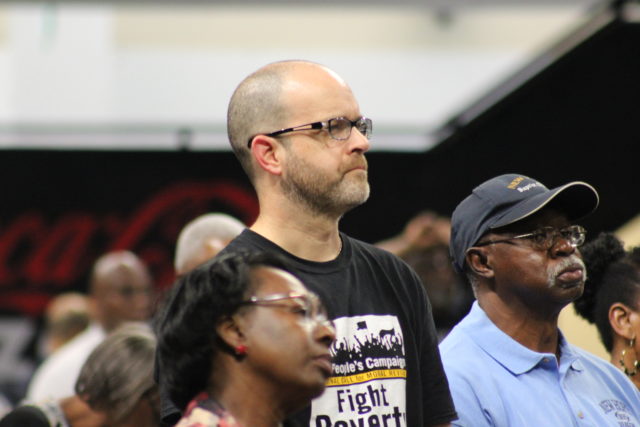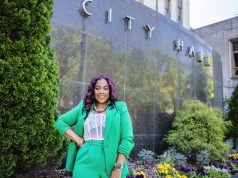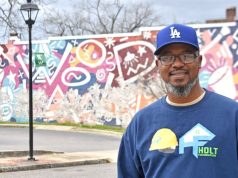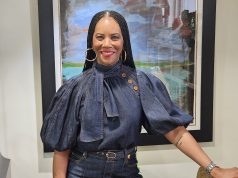By Ariel Worthy
The Birmingham Times
David Barnhart is not your traditional clergyman. The 45-year-old pastor of St. Junia Methodist Church, which he established in 2013, began conducting services in a bar to reach people.
“What we realized is that, even though we were meeting in a bar and people thought that was cool, it was also kind of gimmicky,” he said. “What most people found appealing was the authenticity, so we started as a house-church model.”
He and St. Junia’s members, which average about 60, currently meet at homes throughout the area, including Crestwood, Vestavia Hills, and Trussville. The congregation is focused on connecting people, having one-on-one conversations, and following “early church models of the practice of Christianity.”
“We do practices, not programs,” said Barnhart.
‘Congregational Justice’
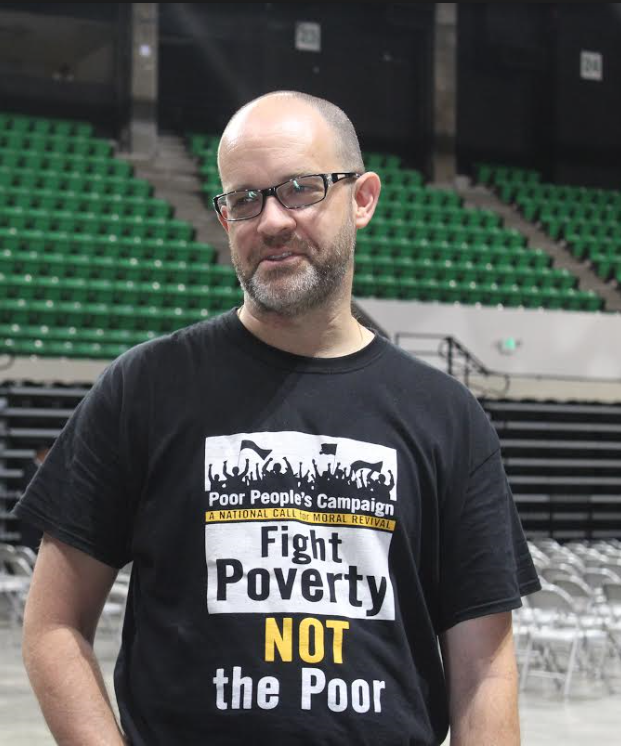
Barnhart is also co-chair of the Birmingham Leadership Council of Faith in Action Alabama, a federation comprised of multifaith, multiracial members who work “to honor God by achieving systemic change to create pathways of opportunity for all Alabamians.”
“We have four hubs: Mobile, Montgomery, Birmingham, and Huntsville,” Barnhart said, adding that his focus in the organization is to develop “congregational justice teams in each congregation.”
Currently, the group includes about 25 congregations or faith leaders representing a place of worship. Barnhart said the plan is to have those congregations “own” a piece of their work. One of those works is the Peacemakers, a group of pastors in both the eastern and western areas of Birmingham that walk the streets at night and go door-to-door to pray with residents. Other works include voter rights and registration, as well as civil rights.
Show Love
Barnhart, who is from Huntsville, said he wants predominantly white churches to understand systemic racism.
“When people ask, ‘How can I help?’ we’re able to plug them in,” he said. “It might not be that they … go do night walks, but they can support in other ways. That’s part of this—how do we have each other’s backs?”
One way is to show love, Barnhart said.
“Churches are really good at loving God publicly and privately in Bible study, doing charity,” he said. “But [professor and activist] Cornel West said what love looks like in public is justice. So, I think, ‘How does the church show love to its city, its state?”
Called to Ministry
Barnhart grew up as Methodist, and his family was fairly progressive in its approach to the world: “I didn’t grow up in a fundamentalist household, although earlier in my calling I leaned in that direction.”
Barnhart said he first felt called to ministry when he was around 19 years old and a student at Vanderbilt University. One of his biggest influences was David Buttrick, his preaching professor at the institution.
“One of the cool things about him was … he clued me in to the idea that Jesus was sarcastic sometimes,” Barnhart recalled. “The way Jesus talks about parables, he was really flipping people’s expectations at times. When he described the parables that way, I began to recognize that Jesus had a personality. He’s not just floating around two feet off the ground spouting platitudes. He got frustrated, he ripped religious leaders.
“He said things that would be radically offensive in church today. Once [Buttrick] described [Jesus] like that, I was like, ‘Of course, I would follow that Jesus around.’ My favorite is the parable of the good Samaritan. If you retell that today, you say, ‘There was a Baptist who passed by an injured person, a Methodist who passed by an injured person, and a Muslim stopped and helped him. If you want to get into heaven, why don’t you try to be more like an exemplary Muslim?’ That would make people so mad today. That’s why they crucified [Jesus]—he offended them.”
Turning Point
Before being called to ministry, Barnhart said he considered himself a conservative.
“What began to change for me was being in ministry with people,” he said. “Sitting down with people in my office and listening to their stories, I started to question the things I had assumed, like ‘Poor people are poor because it’s their fault’ or ‘People can choose to be gay or not.’”
Having some people come out as gay to him was a turning point.
“There was a guy sitting in my office, and he told me how he had self-harmed because of his spiritual hatred for himself because he identified as gay,” Barnhart said. “I prayed with him, he left the office, and I prayed, ‘God, I need to know more. Show me what I need to know.’”
It just so happened that Matthew 23 was Barnhart’s Bible daily devotional that day.
“In Matthew 23, [where Jesus warns against hypocrisy], it was like getting hit in the head with a shovel,” he said. “I had prayed, and that was an answer. It was clear to me in that moment that my goal as a pastor, one who professed to care for other people, was that I couldn’t tie up a burden on someone else that I didn’t have to bear.
“I thought, ‘If I’m going to have spiritual care about this person, something in my theology is going to have to change.’”
Being connected with Faith in Action Alabama has allowed Barnhart to meet a lot of activists, some of whom aren’t in church.
“A lot of these people who aren’t in church have high ideals, have been betrayed by the church,” he said. “You have to take a hard look at the way Christianity comes off to non-Christians.”
‘Systemic Sin’
Barnhart—formerly an associate pastor at Trinity Methodist in Homewood and at a rural church, Fairview United Methodist in Centre, Ala.—often refers to “systemic sin” as a big problem in churches.
“In our culture, we look at something like poverty and say, ‘Oh, it’s unfortunate that those people are in poverty.’ We look at it as though it’s the weather,” he said. “If you look at what is actually happening to keep them in poverty, … our tendency is to find someone to blame, but sometimes it’s the fault of all of us.”
Arrested
Another example of systemic sin, Barnhart said, is taking voting rights from ex-felons.
“People think they have the right to do that,” he said. “When I got arrested [recently], officers asked us why we were being arrested. I said, ‘Because [Alabama] Secretary of State John Merrill won’t tell ex-felons that they might be able to have their voting rights restored.
“The officer said, ‘Don’t you think felons should lose their voting rights?’ He wanted me to say, ‘Well, it depends on what they have done.’ But, the fact is, once you get to a situation where one third of African-American men can’t vote, who is that benefitting? That’s systemic sin.”
Barnhart also points to the state’s antiquated 1901 Constitution.
“We know who wrote it, but the fact that it persists and disenfranchises people, and no one moves to change it, that’s our fault,” he said. “That’s systemic sin.”
Barnhart is also part of the Poor People’s Campaign, an organization that fights systemic racism, poverty, and inequality; the Rev. Dr. Martin Luther King Jr. was the campaign’s leader before his assassination. Barnhart’s work with that campaign is why he got arrested for protesting at the state’s capitol. Each week, the group protests against a different cause. The week Barnhart got arrested, he was protesting at Merrill’s office.
“We were listing the things that the state continues to ignore and inflict on poor people and disempowered people,” Barnhart said. “We stayed after closing time, so we were arrested for criminal trespassing.”
The pastor and others arrested with him pled guilty during their court date and were fined $10, but after court costs they owed more than $300. When Barnhart saw the fines, he noticed that it was another way the courts take advantage of poor people. A week after that arrest, he was arrested again for dusting a Confederate memorial with chalk.
“We were arrested for criminal tampering,” Barnhart said. “The fact that we have all these Confederate memorials and holidays, … [shows that] our state is continuing to advance a white supremacist agenda. We’re going to draw attention to it.”

